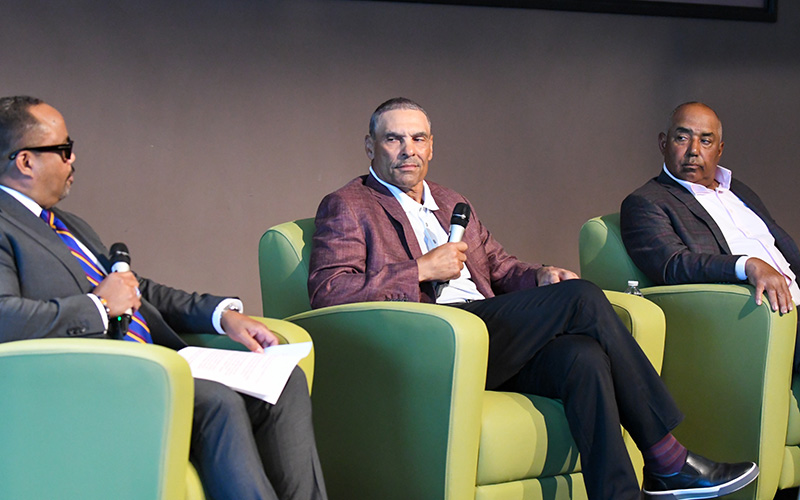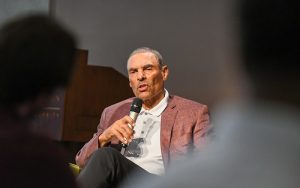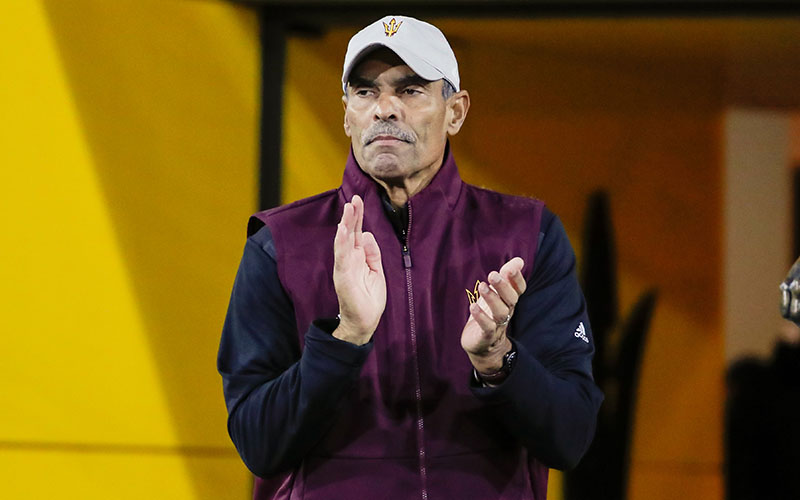
Arizona State football coach Herman Edwards, center, and special advisor to the head coach Marvin Lewis, right, speak with Battinto Batts Jr., dean of ASU’s Cronkite School, during a discussion about race, diversity and the NFL. (Photo by Dominic Rivera/Cronkite News)
PHOENIX – On the heels of news that former Arizona Cardinals coach Steve Wilks has joined a class-action racial discrimination lawsuit against the NFL and other teams, several of Arizona State’s top athletic leaders reflected Thursday on the sport’s hiring practices and called for the league, and society, to do better.
“In the NFL, you have a long deep history of folks, not really open-minded, until they are forced, either financially or legally, to make appropriate changes and opportunity available,” said Ray Anderson, ASU’s vice president for university athletics.
Anderson joined ASU football coach Herm Edwards, special advisor to the head coach Marvin Lewis and awarding sports journalist William C. Rhoden in a panel at ASU’s Walter Cronkite School of Journalism and Mass Communication called “On The Clock & In the Media: Race, Hiring and the NFL.”
Earlier in the day, news broke that two NFL coaches were joining former Miami Dolphins head coach Brian Flores’ lawsuit against the league and three of its teams for alleged racial discrimination: Wilks, who was the Arizona Cardinals’ head coach in 2018, and Roy Horton, who interviewed for the Tennessee Titans’ head coaching job in 2016 and was a Cardinals defensive coordinator in 2011 and 2012.
Wilks alleged that he was just a bridge coach and didn’t feel he had enough opportunity to succeed with the Cardinals. In that 2018 campaign, he led the Cardinals to a 3-13 record
“When Coach Flores filed this action, I knew I owed it to myself and to all Black NFL coaches and aspiring coaches to stand with him,” Wilks said in a statement. “This lawsuit has shed further important light on a problem that we all know exists, but that too few are willing to confront. Black coaches and candidates should have exactly the same ability to become employed and remain employed as (white) coaches and candidates. That is not currently the case, and I look forward to working with coach Flores and coach Horton to ensure that the aspiration of racial equality in the NFL becomes a reality.”

Edwards said part of the reason he believes change is slow is because “in the National Football League, you don’t see ownership changing a lot.” (Photo by Dominic Rivera/Cronkite News)
The Cardinals released a statement in response, saying, “The decisions we made after the 2018 season were very difficult ones. But as we said at the time, they were entirely driven by what was in the best interests of our organization and necessary for team improvement. We are confident that the facts reflect that and demonstrate that these allegations are untrue.”
When asked why progress seems to be slower in the NFL than other leagues, Edwards said, “In the National Football League, you don’t see ownership changing a lot … and remember, there’s 32 teams.”
Although approximately 70 percent of NFL players are Black, the league has just one Black head coach and just five minority head coaches. A recent study by ASU’s Global Sport Institute that covered the 2002–03 to 2019–20 seasons revealed that of the 115 head coaching hires in that time period, 92 were white men. Additionally, there were three seasons when no head coaches of color were hired. It also pointed out that white and minority head coaches had similar winning percentages.
At its recent league meetings, the NFL adeopted a policy requiring all 32 NFL teams to have a minority offensive assistant coach in place for the 2022 season.
Resolution of the Flores lawuit could take time said Anderson, who previously was a longtime executive vice president of football operations for the NFL as well as an executive vice president and chief administrative officer for the Atlanta Falcons.
“It’s going to be a long and complicated process. I have no idea how it’s going to end up,” Anderson said. “I don’t see a prompt resolution and additional coaches will ultimately join I believe.
“The owners have a lot more money to spend on attorneys but I think there’s enough interest from the public sector that coach Flores and other class members won’t be driven out of court for lack of financing.”
The NFL adopted the Rooney Rule in 2003 with the hope of diversify the league. Anderson, who was part of the working committee, is disappointed in its direction.
“I think they should take the Rooney name off now. It has no teeth and it’s an embarrassment,” he said. “Mr. Dan Rooney was a real advocate and really meant to have change. Now when you think of the Rooney Rule, frankly, it’s a negative perception. And I think that’s offensive personally.”
Edwards does believes the NFL has improved its efforts.
“There is diversity at all positions, the league has changed. They have done a good job,” said Edwards, who also warned that the work is not done. “But this should not be a discussion in America. This thing is deeper than we can imagine.”
The NFL is not the only league that has shifted its focus to improve diversity. Major League Baseball has recently hired more former players who are Black to help Commissioner Rob Manfred amplify diversity and impact communities.
“I would imagine all the other leagues are very concerned about getting into situations with diversity,” Lewis said. “Such light has been shined on it so I imagine they’re looking at their own policies so they don’t get into those situations.”
Edwards said he will continue to fight for change.
“I’m not gonna give up. One thing you can’t do is you can’t quit,” he said. “Life’s not about tapping out. Can’t tap out. That’s not an option.”
His final message?
“It’s easy to throw my hands up and say why me? I tell people this all the time. Life ain’t never gonna be fair. Life’s about this: You bet on yourself. That’s what matters most,” he said.


